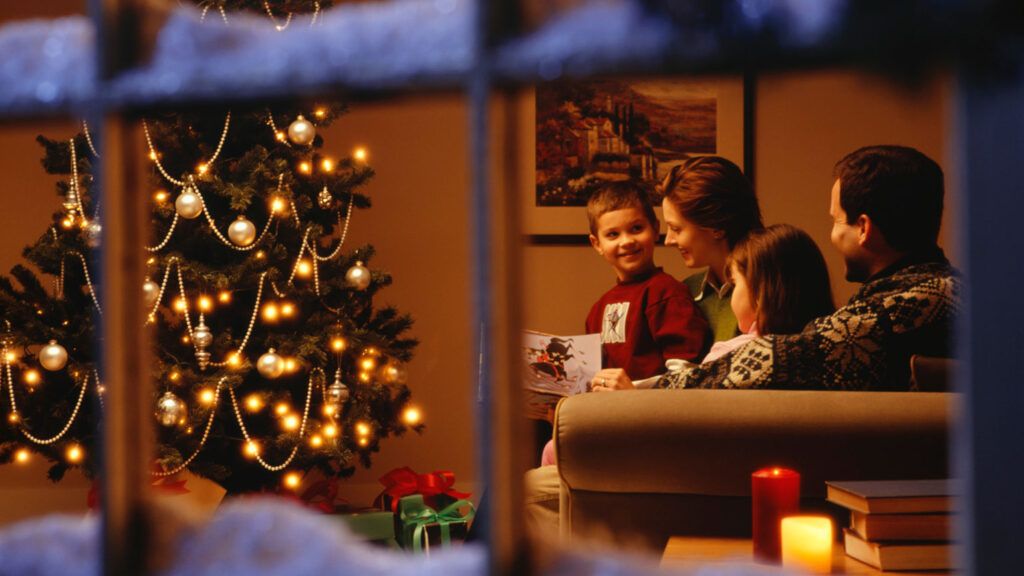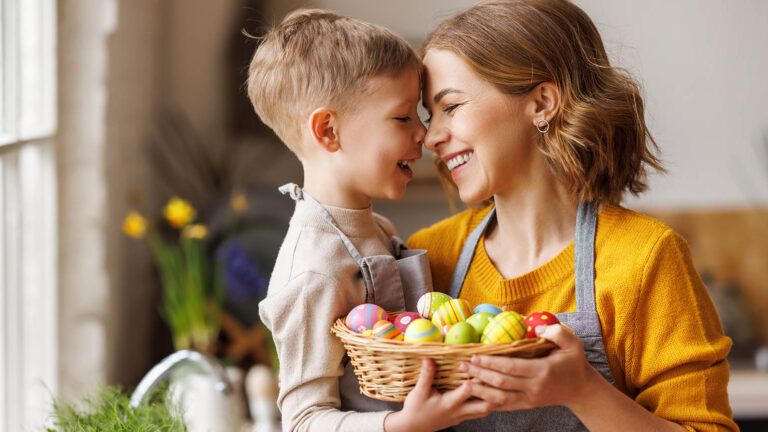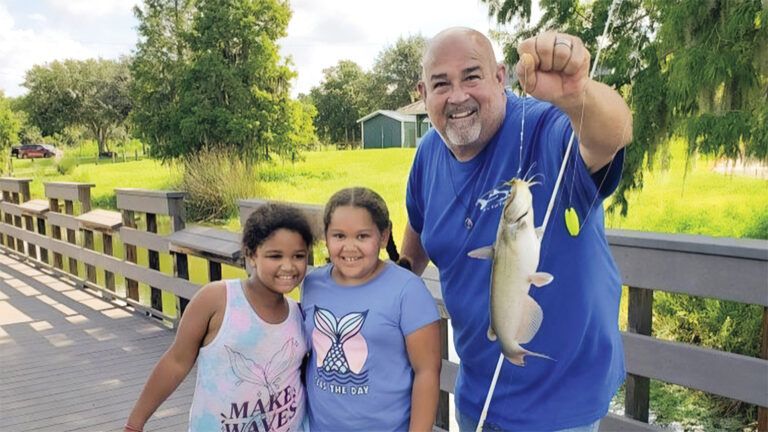I am Gabriel, that stand in the presence of God….—Luke 1:19
So it comes again, this marvelous Christmas season, the time of chimes and carols, of joy and wonder. A time of fond memories, too, when people look back with love and longing to other Christmases.
There are three particular Christmases in my own past that had a special warmth for me. As everyone knows, gold and frankincense and myrrh were the first Christmas offerings.
The gifts given to me on those three occasions were invisible, but they were no less real. Each came unexpectedly—and each left me a changed person.
I. Some of my most impressionable boyhood years were spent in Cincinnati. I still remember the huge Christmas tree in Fountain Square—the gleaming decorations, the streets ringing with the sound of carols.
Up on East Liberty Street, where we lived, my mother always had a Christmas tree with real candles on it, magical candles which, combined with the fir tree, gave off a foresty aroma, unique and unforgettable.
One Christmas Eve when I was 12, I was out with my minister father doing some late Christmas shopping. He had me loaded down with packages and I was tired and cross.
I was thinking how good it would be to get home when a beggar—a bleary-eyed, unshaven, dirty old man—came up to me, touched my arm with a hand like a claw and asked for money. He was so repulsive that instinctively I recoiled.
Softly my father said, “Norman, it’s Christmas Eve. You shouldn’t treat a man that way.”
I was unrepentant. “Dad,” I said, “he’s nothing but a bum.”
My father stopped. “Maybe he hasn’t made much of himself, but he’s still a child of God.” He then handed me a dollar—a lot of money for those days and for a preacher’s income.
“I want you to take this and give it to that man,” he said. “Speak to him respectfully. Tell him you are giving it to him in Christ’s name.”
“Oh, dad,” I protested, “I can’t do anything like that.”
My father’s voice was firm. “Go and do as I tell you.”
So, reluctant and resisting, I ran after the old man and said, “Excuse me, sir. I give you this money in the name of Christ.”
He stared at the dollar bill, then looked at me in utter amazement. A wonderful smile came to his face, a smile so full of life and beauty that I forgot that he was dirty and unshaven. I forgot that he was ragged and old.
With a gesture that was almost courtly, he took off his hat. Graciously he said, “And I thank you, young sir, in the name of Christ.”
All my irritation, all my annoyance faded away. The street, the houses, everything around me suddenly seemed beautiful because I had been part of a miracle that I have seen many times since—the transformation that comes over people when you think of them as children of God, when you offer them love in the name of a Baby born two thousand years ago in a stable in Bethlehem, a person who still lives and walks with us and makes His presence known.
That was my Christmas discovery that year—the gold of human dignity that lies hidden in every living soul, waiting to shine through if only we’ll give it a chance.
II. The telephone call to my father came late at night, and from a most unlikely place—a house in the red-light district of the city. The woman who ran the house said that one of the girls who worked there was very ill, perhaps dying.
The girl was calling for a minister. Somehow the woman had heard of my father. Would he come?
My father never failed to respond to such an appeal. Quietly he explained to my mother where he was going. Then his eyes fell upon me. “Get your coat, Norman,” he said. “I want you to come too.”
My mother was aghast. “You don’t mean you’d take a fifteen-year-old boy into a place like that!”
My father said, “There’s a lot of sin and sadness and despair in human life. Norman can’t be shielded from it forever.”
We walked through the snowy streets and I remember how the Christmas trees glowed and winked in the darkness. We came to the place, a big old frame house.
A woman opened the door and led us to an upstairs room. There, lying in a big brass bed, was a pathetic, doll-like young girl, so white and frail that she seemed like a child, scarcely older than I was.
Before he became a minister, my father had been a physician and he knew the girl was gravely ill. When he sat on the edge of the bed, the girl reached for his hand. She whispered that she had come from a good Christian home and was sorry for the things she had done and the life she had led.
She said she knew she was dying and that she was afraid. “I’ve been so bad,” she said. “So bad.”
I stood there listening. I didn’t know what anybody could do to help her. But my father knew. He put both his big strong hands around her small one. He said, “There is no such thing as a bad girl. There are girls who act badly sometimes, but there are no bad girls—or bad boys either—because God made them and He makes all things good. Do you believe in Jesus?”
The girl nodded. He continued, “Then let me hear you say, ‘Dear Jesus, forgive me for my sins.’ “She repeated those words. “Now,” he said, “God loves you, His child who has strayed, and He has forgiven you, and no matter when the time comes, He will take you to your heavenly home.”
If I live to be a hundred, I will never forget the feeling of power and glory that came into that room as my father then prayed for that dying girl. There were tears on the faces of the other women standing there, and on my own, too, because everything sordid, everything corrupt was simply swept away.
There was beauty in that place of evil. The love born in Bethlehem was revealing itself again on a dark and dismal street in Cincinnati, Ohio, and nothing could withstand it. Nothing.
So that was the gift I received that Christmas, the frankincense-knowledge that there is good in all people, even the sad and the forlorn, and that no one need be lost because of past mistakes.
III. It was Christmas Eve in Brooklyn. I was feeling happy because things were going well with my church. As a young bachelor minister I had just had a fine visit with some parishioners and was saying good-by to them on their porch.
All around us houses were decorated in honor of Christ’s birthday. Suddenly a pair of wreaths on the house across the street caught my eye.
One had the traditional red bow, bright and gay. But the ribbon on the other was a somber black—the symbol of a death in the family, a funeral wreath.
Something about that unexpected juxtaposition of joy and sorrow made a strange impression on me. I asked my host about it. He said that a young couple with small children lived in the house but he did not know them. They were new in the neighborhood.
I said good night and walked down the street. But before I had gone far, something made me turn back. I did not know those people either. But it was Christmas Eve and if there was joy or suffering to be shared, my calling was to share it.
Hesitantly I went up to the door and rang the bell. A tall young man opened the door. I told him that I was a minister whose church was in the neighborhood. I had seen the wreaths, I said, and wanted to offer my sympathy.
“Come in,” he said quietly.
The house seemed very still. In the living room a coal fire was burning. In the center of the room was a small casket. In it was the body of a little girl about six years old. I can see her yet, lying there in a pretty white dress, ironed fresh and clean.
Nearby was an empty chair where the young man had been sitting, keeping watch beside the body of his child.
I was so moved that I could barely speak. What a Christmas Eve, I thought. Alone in a new neighborhood, no friends or relatives, a crushing loss. The young man seemed to read my thoughts.
“It’s all right,” he said, as if he were reassuring me. “She’s with the Lord, you know.” His wife, he said, was upstairs with their two smaller children. He took me to meet her.
The young mother was reading to two small boys. She had a lovely face, sad yet serene. And suddenly I knew why this little family had been able to hang two wreaths on the door, one signifying life, the other death.
They had been able to do it because they knew it was all one process, all part of God’s wonderful and merciful and perfect plan for all of us. They had heard the great promise that underlies Christmas: “Because I live, ye shall live also.”—John 14:19
They had heard it and they believed it. That was why they could move forward together with love and dignity, courage and acceptance.
So that was the gift I received that year, the reaffirmation that the myrrh in the Christmas story is not just a reminder of death, but a symbol of the love that triumphs over death.
The young couple asked if they could join my church. They did. We became good friends. Many years have passed since then, but not one has gone by without a Christmas card from some member of that family expressing love and gratitude.
But I am the one who is grateful.





